In this edition of Court judgements review, we look at the Supreme Court’s judgement on the share of children from void marriage in parents’ property, Allahabad High Court’s judgement on prolonged separation as a form of Cruelty, Karnataka High Court’s judgement on disclosures in election nomination forms, Delhi High Court’s judgement on maintenance under domestic violence act, and Kerala High Court’s order on ‘Criminal Misconduct’ under Prevention of Corruption Act.
Supreme Court: Children born from a marriage deemed void are entitled to rights regarding their parents’ property.
In Raja Gounder and Others vs. M. Sengodan and Others, the apex court held that any child born of a marriage, which would have been considered legitimate had the marriage been valid, is granted legal legitimacy by statute. Such a child is entitled to rights over or in the property of their parents, not in the property of any other individual.
The two-judge bench comprising of Justice M.M. Sundresh and Justice S.V.N. Bhatti was hearing an appeal against the judgement of the High Court. The brief facts of the case are as follows: Muthusamy Gounder had three marriages, out of which two are deemed to be void. He had five children- four sons and a daughter out of these three marriages. The legitimate son filed a partition lawsuit before the trial court, which adjudicated it in his favour. The other offsprings filed an appeal against this judgement in Madras High Court, which was subsequently dismissed. The current petition is against this order.
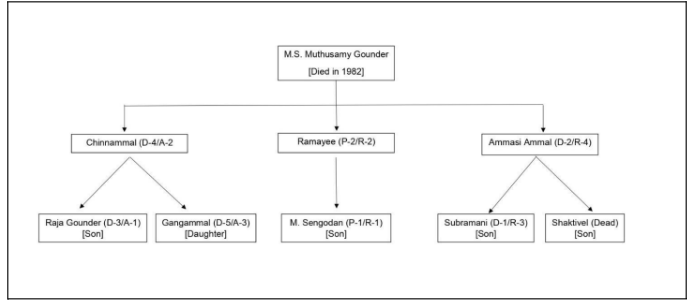
The trial court and High Court held that no evidence is presented by A-2 and R-2 to prove the factum of the marriage with Muthusamy Gounder. As a result, their claim for the status of the children through the extended family as coparceners was rejected.
The apex court looked at the material evidence such as the mortgage deed, joint patta, and voters lists, which declared that A-1, R-1, and R-3 as sons of Muthusamy Gounder. Thus, A-1 and R-1 as sons of Muthusamy Gounder is an inescapable consequential conclusion reached by the Court. The court relied on a similar case, Nirmala vs. Rukminibai, whereby the Karnataka High Court considered the binding nature of admission by a common ancestor in a matter of inheritance under Section 18 of the Indian Evidence Act, 1872.

Further, the court held that once it is established that the other offspring are extended family, irrespective of whether such marriage is void or not, denying them a share in the common property is unsustainable in law. The court relied on the apex court judgement in Revanasiddappa and another vs. Mallikarjun and others, which read down sections of the Hindu Marriage Act, 1955, and Hindu Succession Act, 1956, and held that a child born from a void marriage will have rights to or in the property of the parents.
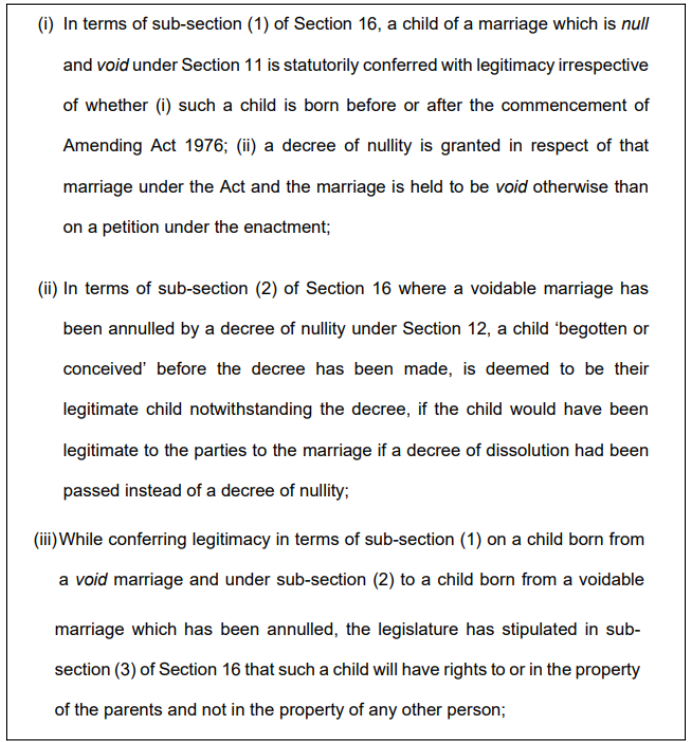
Accordingly, the judgements of trial and High Courts are set aside, and a preliminary decree of partition is passed.
Allahabad HC: Long period of continuous separation amounts to cruelty under Section 13 (1) (ia) of the Hindu Marriage Act, 1955.
The Allahabad High Court, in Charu Chug Alias Charu Arora vs. Madhukar Chugh, held that living separately for a considerable amount of time itself amounts to cruelty under Section 13 (1)(ia) of the Hindu Marriage Act, 1955, and becomes a ground for divorce.
The division bench of the High Court comprising of Justice Vivek Kumar Birla and Justice Donadi Ramesh was hearing an appeal against the order of the Family court in divorce petition. The brief facts of the case are as follows. The appellant wife and the respondent husband were married on 15 April 2002, as per Hindu traditions. Post-wedding, the couple stayed together only for a short period and never lived together continuously for long periods. The husband, in a divorce petition, asserted that he was deserted by his wife, and was subjected to mental and physical cruelty. During the reconciliation proceedings, it was recorded that she was not interested in conciliation proceedings or any compromise in the matter.
During proceedings, it was found that the wife committed mental cruelty by leveling false allegations of demand of dowry, physical abuse, and extra-marital affairs of the husband.
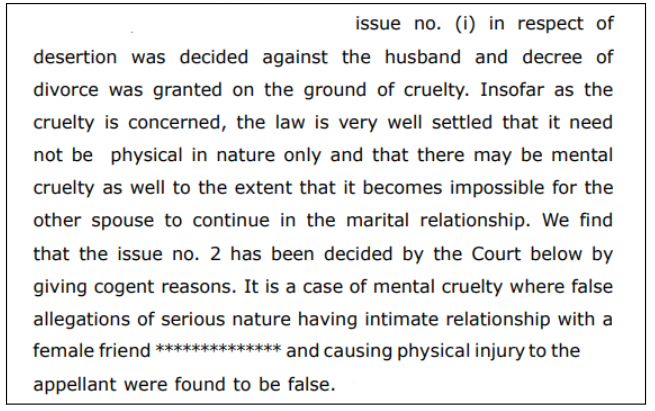
The High Court relied on the apex court judgement in Rakesh Raman vs. Kavita, whereby it was held that the long separation and absence of cohabitation and the complete breakdown of all meaningful bonds and the existing bitterness between the two, has to be read as cruelty under section 13(1) (ia) of the Hindu Marriage Act, 1955. The apex court, in the above case, relied on the three-judge bench judgement in Samar Ghosh vs. Jaya Ghosh, which broadened the scope of mental cruelty in divorce proceedings.
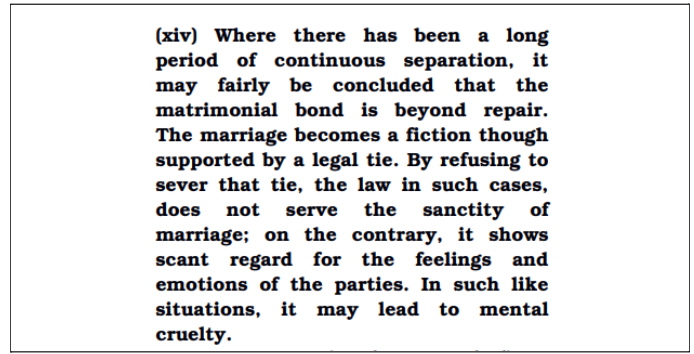
Accordingly, the court did not find any suitable ground to set aside the divorce, and the appeal was dismissed.
Karnataka HC: Electoral candidates must reveal about legal cases filed against them, regardless of whether they were acquitted or if the case was dismissed.
In Mudiyappa vs. Basavaraj @ Basappa & Others, the Karnataka High Court held that whenever a candidate submits nomination forms, they are required to disclose any criminal cases filed against them, regardless of whether they were acquitted or if the case was dismissed. Irrespective of the impact of the disclosure on the election, all details of the particular candidate must be available for the electorate to decide.
The single-judge bench comprising of Justice Suraj Govindaraj was hearing a petition against the trial court order that set aside his election to gram panchayat for failure to disclose an acquittal. The counsel for the appellant argued that such disclosure is only in cases of convictions and not in cases of acquittals since acquittals absolve all liability. However, the counsel for the respondents argues that all criminal proceedings must be declared, irrespective of the final status.
Hearing both sides, the court listed the following issues that need to be considered.
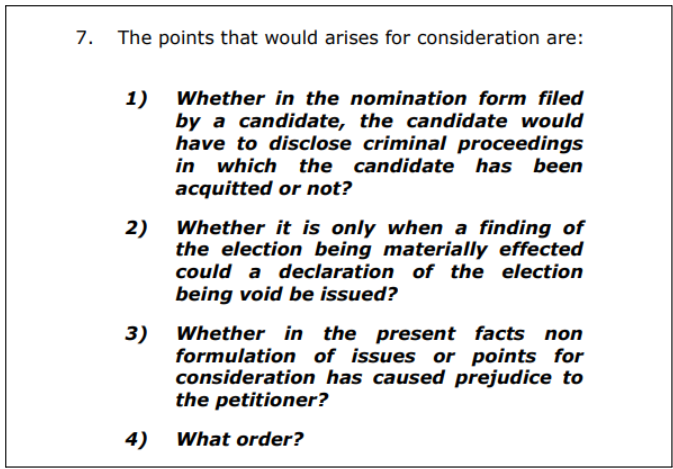
On the issue of disclosure of criminal proceedings in cases of acquittal, the court held that the mere fact of filing a complaint and starting criminal proceedings is enough for a candidate to mention it in their nomination form. On the issue of the election being declared void, non-disclosure of relevant details amounted to suppression since the electorate had the right to know all criminal antecedents. Accordingly, the election is declared void.
On election being materially affected, the court relied on the apex court judgement in Democratic Union of India vs. Association for Democratic Reforms and another with Peoples Union for Civil Liberties and another vs. Union of India and another, wherein the Apex Court has imposed a duty of disclosure on each and every candidate along with nomination form filed. It is the duty of the candidate to disclose all material facts irrespective of whether such disclosures materially affect the result of the election.
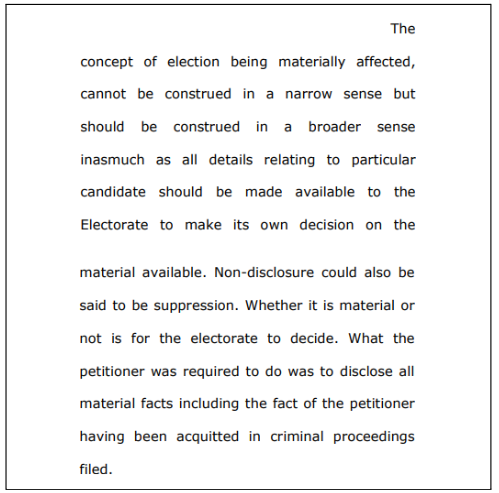
Since this is a case of non-disclosure, the High Court did not find fault with the order of the Trial court. Accordingly, the petition is dismissed.
Delhi HC: Even if there is a determination of cruelty against the wife, that alone cannot be a sufficient reason to deny maintenance.
In A vs. B, the Delhi High Court held that there is no bar of cruelty in the right of a wife to claim maintenance, even if such cruelty is proved in divorce cases. Findings of cruelty in divorce proceedings cannot by themselves be a basis for denying maintenance.
The single-judge bench comprising Justice Amit Bansal was hearing a petition by the wife challenging the judgement passed by the Additional Sessions Judge (Appellate Court), South-East District, Saket Courts, New Delhi, that set aside the Trial court’s judgement which directed the husband to pay a sum of Rs.1,00,000/- per month towards maintenance as well as compensation under Section 22 of the Protection of Women from Domestic Violence Act, 2005 (DV Act) to the Wife. The facts of the case are as follows. The couple got married on 10 February 1991, through Arya Samaj rituals, and they had a child born on 28 December 1991. The wife claimed that her husband, who she says is an alcoholic, would often physically abuse their child while under the influence, leading to the child experiencing an 80% loss of hearing in his left ear. In response, the wife filed a complaint under Section 12 of the Domestic Violence (DV) Act in the Trial Court. The Trial Court concluded that the wife had suffered domestic violence and qualified as an ‘aggrieved person’ under Section 2(a) of the DV Act. However, the husband appealed this judgment at the Sessions Court, which overturned the Trial Court’s decision and sent the case back for a retrial.
On the issue of whether the Judgment in Divorce Proceedings would have any bearing on the present proceedings, the court relied on the apex court judgement in Raj Talreja vs. Kavita Talreja, wherein it was held that the findings of cruelty against the wife by itself cannot be the basis to deny maintenance to the wife.
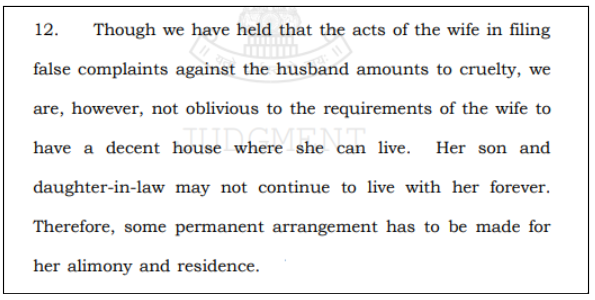
Accordingly, the petition is disposed.
Kerala HC: Mere conduct and action of the accused contrary to rules and departmental norms would not amount to criminal misconduct by a public servant under Prevention of Corruption Act.
The Kerala High Court, in C. Surendranath vs. State of Kerala held that ‘Dishonest intention’ is sine qua non to attract offence punishable under section 13(1)(d) of the Prevention of Corruption Act, 1988. Any action that is merely contrary to rules and departmental norms is not criminal misconduct unless dishonest intention is involved.
The single-judge bench comprising of Justice K Babu was hearing a petition seeking to quash the FIR and all further proceedings against them registered by the Vigilance and Anti-Corruption Bureau, Kasaragod. The allegation is that the petitioners, both of whom are part of tender assessment teams for manual dredging and sale of port sand, acted with dishonest intentions, engaged in criminal misconduct, and conspired with other individuals who represented societies involved in the tender process for manual sand dredging in port zones. They violated tender procedures and unfairly granted the sand dredging contract to three ineligible societies.
While the counsel for petitioners termed the allegations as baseless, the counsel for the Government alleged an illegal nexus of the petitioners with other accused. Upon hearing both sides, the court looked at the provisions of section 13(1)(d) of the Prevention of Corruption Act, 1988.
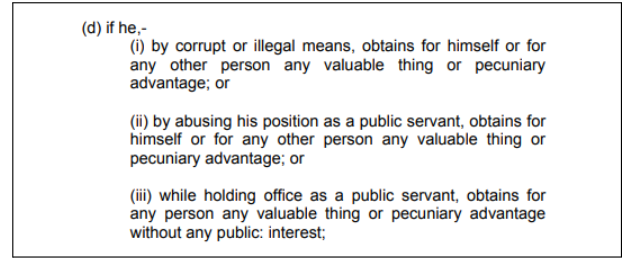
The court held that the objection behind the legislation is not to penalize a public servant for mistakes in their decisions but to penalize them for engaging in corrupt practices. Further, to be considered a violation of sub-clause (ii) of Clause (d) of sub-section (1) of Section 13 of the PC Act, the actions or decisions of the public servant must involve dishonesty and constitute corruption.
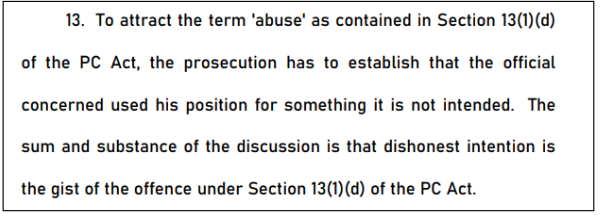
Further, the court relied on the judgement of the apex court in Zakia Ahsan Jafri vs. State of Gujarat, wherein it was held that not every act of doing something or refraining from doing it leads to the formation of a criminal conspiracy unless the actions are done intentionally, and there is an agreement among all involved parties. It further held that,
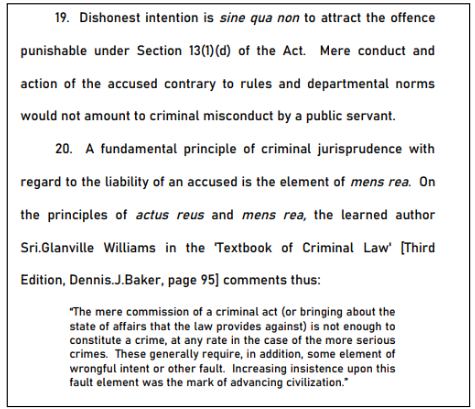
In the current case, the First Information Report (FIR) and the Final Report fail to specify the alleged offenses. There is no indication or suspicion of the petitioners committing any crimes. Allowing the proceedings to continue under these circumstances would be an abuse of the court’s process. Accordingly, the FIR and all further proceedings are quashed.


